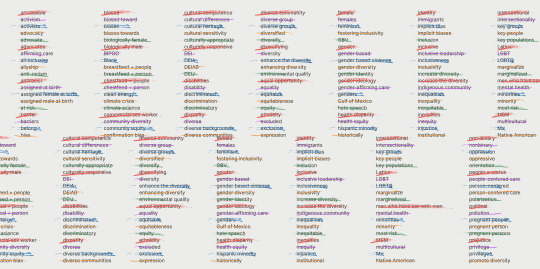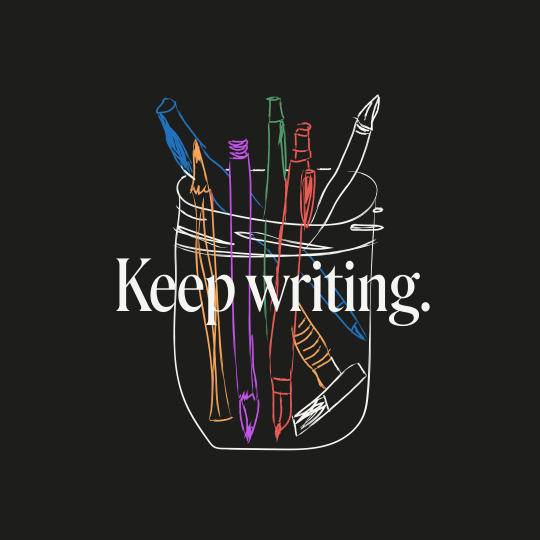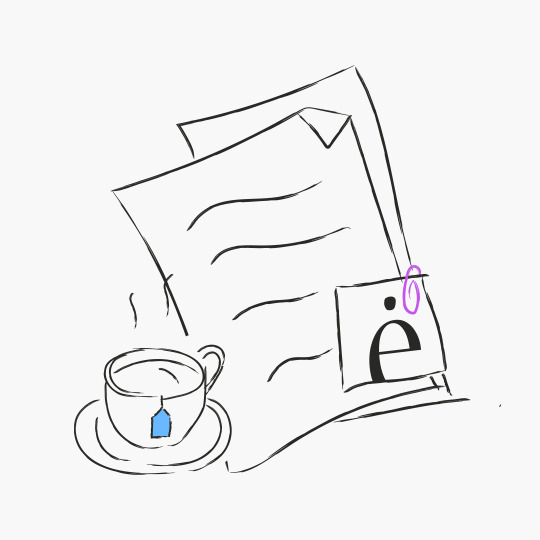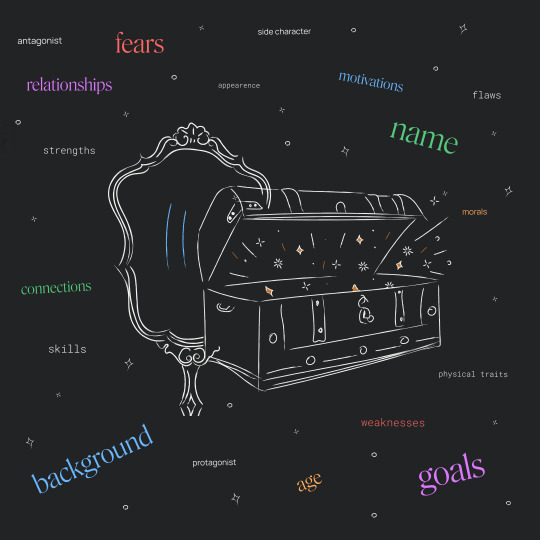Ellipsus... a tool that makes it easy to collaborate on writing.
Don't wanna be here? Send us removal request.
Text

We know that privacy, safety, and security are incredibly important concerns for writers right now.
So we’re running a short (anonymous!) survey about privacy, safety, and creative tools—what that means for writers; what features you need when it comes to protecting your work, identity, and creative freedom… and how Ellipsus can build around it.
Your answers will help us shape new features that stay true to our values, and yours.
Check it out here—we’d love to hear from you! <3
- the Ellipsus Team xo
#writeblr#writers on tumblr#writing#fiction#fanfic#fanfiction#collaborative writing#collaboration#creative writing#writers community#anti ai#ellipsus
197 notes
·
View notes
Text

Each week (or so), we'll highlight the relevant (and sometimes rage-inducing) news adjacent to writing and freedom of expression. This week:
Inkitt’s AI-powered fiction factory
Inkitt started in the mid-2010s as a cozy platform where anyone could share their writing. Fast forward twenty twenty-fuckkkkk, and like most startups, it’s pivoted hard into AI-fueled content production with the soul of an algorithm.

Pictured: Inkitt preparing human-generated work for an AI-powered flume ride to The Unknown.
Here’s how it works: Inkitt monitors reader engagement with tracking software, then picks popular stories to publish on its premium app, Galatea. From there, stories can get spun into sequels, spinoffs, or adapted for GalateaTV… often with minimal author involvement. Authors get an undisclosed cut of revenue, but for most, it’s a fraction of what they’d earn with a traditional publisher (let alone self-publishing).
“'They prey on new writers who have no idea what they’re doing,' said the writer of one popular Galatea series."
Many, many authors have side-eyed or outright decried the platform as inherently predatory for years, due to nebulous payout promises. And much of the concern centers on contracts that don’t require authors’ consent for editorial changes or AI-generated “additions” to the original text.
Now, Inkitt has gone full DiSrUpTiOn, leaning heavily on generative AI to ghostwrite, edit, generate audiobook narration, and design covers, under the banner of “democratizing storytelling.” (AI? In my democratized storytelling platform? It’s more likely than you think.)

Pictured: Inkitt’s CEO looking at the most-read stories.
But Inkitt’s CEO doesn’t seem too concerned about what authors think: “His business model doesn’t need them.”

The company recently raised $37 million, with backers including former CEOs of Sony, Penguin, and HarperCollins, proving once again that publishing loves a disruptor… as long as it disrupts creatives, not capital. And more AI companies are mushrooming up to chase the same vision: “a vision of human-created art becoming the raw material for AI-powered, corporate-owned content-production machines—a scenario in which humans would play an ever-shrinking role.”
(Not to say we predicted this, but…)
Welcome to the creator-industrial complex.

Publishers to AI: Stop stealing our stuff (please?)
Major publishers—including The New York Times, The Washington Post, The Guardian, and Vox Media—have launched a "Support Responsible AI" campaign, urging the U.S. government to regulate AI's use of copyrighted content.
Like last month's campaigns by the Authors Guild and the UK's Society of Authors, there's a website where where you can (and should!) contact your representatives to say, “Hey, maybe stop letting billion-dollar tech giants strip-mine journalism.”
The campaign’s ads carry slogans like “Stop AI Theft” and “AI Steals From You Too” and call for legislation that would force AI companies to pay for the content they train on and clearly label AI-generated content with attribution. This follows lobbying by OpenAI and Google to make it legal to scrape and train on copyrighted material without consent.
The publishers assert they are not explicitly anti-AI, but advocate for a “fair” system that respects intellectual property and supports journalism.
But… awkward, The Washington Post—now owned by Jeff Bezos—has reportedly already struck a deal with OpenAI to license and summarize its content. So, mixed signals.
Still, as the campaign reminds us: “Stealing is un-American.”
(Unless it’s profitable.)

#WarForever
We at Ellipsus love a good meme-turned-megaproject. Back in January, the-app-formerly-known-as-Twitter user @lolt64 tweeted a cryptic line about "the frozen wastes of europa,” the earliest reference to the never-ending war on Jupiter’s icy moon.
A slew of bleak dispatches from weary, doomed soldiers entrenched on Europa’s ice fields snowballed (iceberged?) into a sprawling saga, yes-and-ing with fan art, vignettes, and memes under the hashtag #WarForever.
It’s not quite X’s answer to Goncharov: It turns out WarForever is some flavor of viral marketing for a tabletop RPG zine. But the internet ran with it anyway, with NASA playing the Scorcese of the stars.

In a digital hellworld increasingly dominated by AI slopification, data harvesting, and “content at scale,” projects like WarForever are a blessed reminder that creativity—actual, human creativity—perseveres.
Even on a frozen moon. Even here.

Let us know if you find something other writers should know about, (or join our Discord and share it there!)
- The Ellipsus Team xo

#ellipsus#writblr#writers on tumblr#writing#creative writing#anti ai#writing community#fanfic#fanfiction#fiction#inkitt#us politics
294 notes
·
View notes
Text

New templates, new templates!
If you’re knee-deep in chapter 83 and your characters haven’t even locked eyes yet (we salute your dedication)—or staring down a fix-it fic with dangerously high emotional stakes—we’ve got some templates to help you plan and transform the stories you love.
Find three new templates in Ellipsus (just choose from template when you start a new doc).
The Canon Divergence Template—break the timeline, rewrite the rules, and give your faves the ending they deserve. The Fandom Ship Template—map your ship’s emotional arc, from first emotionally repressed gaze to cathartic confession. The AU Planning Template—modernize, magicalize, or make em rival antique shop owners (you know you want to).
Read the full post over on the blog, and may your slow burns always pay off.
- the Ellipsus Team xo
#writeblr#writers on tumblr#writing#fanfic#fanfiction#fiction#writing prompt#writing prompts#writing ideas#writing inspiration#character sheet#ellipsus
572 notes
·
View notes
Text
We’re always building toward a creative space that works the way you do.
If you’re a visual thinker, a fan of fan art, or like to keep 53 reference pics of your favorite characters close at hand... you'll love our latest update. ✨🖼️ Illustrations, visual inspo, or a few cursed memes—you can upload them all (or any other image) to your docs and drafts!
- The Ellipsus Team xo
#writeblr#writers on tumblr#writing#fanfic#fanfiction#fiction#creative writing#collaborative writing#writing memes#ellipsus#images images images!!!
467 notes
·
View notes
Text

How dare they
927 notes
·
View notes
Text

Ellipsus Digest: April 2
Each week (or so), we'll highlight the relevant (and sometimes rage-inducing) news adjacent to writing and freedom of expression. This week:
Meta trained on pirated books—and writers are not having it
ICYMI: Meta has forever earned a spot as the archetype for Shadowy Corporate Baddie in speculative fiction by training its LLMs on pirated books from LibGen. You're pissed, we're pissed—here's what you can do:
The Author’s Guild of America—longtime champions of authors’ rights and probably very tired of cleaning up this kind of mess (see its high-profile ongoing lawsuits, and January’s campaign to credit human authors over “AI-authored” work)—has released a new summary of what’s going on. They’ve also provided a plug-and-play template for contacting AI companies directly, because right now, “sincerely, a furious novelist” just doesn’t feel like enough.
No strangers to spilling the tea, the UK’s Society of Authors is also stepping up with its roundup of actions to raise awareness and fight back against the unlicensed scraping of creative work. (If you’re across the pond, we also recommend checking out the Creative Rights in AI Coalition campaign—it’s doing solid work to stop the extraction economy from feeding on artists’ work.)

Museums and libraries: fodder for the new culture war
Not to be outdone by Florida school boards and That Aunt's Facebook feed, MAGA’s nascent cultural revolution has turned its attention to museums and libraries. A new executive order (in that big boi font) is targeting funding for any program daring to tell a “divisive narrative” or acknowledge “improper ideology” (translation: anything involving actual history).
The first target is D.C.’s own Smithsonian. The newly restructured federal board has set its sights on “cleansing” the Institution’s 21 museums of “divisive, race-centered ideology.” (couch-enthusiast J.D. Vance snagged himself a board seat.) (Oh, and they’ve appointed a Trump-aligned lawyer to vet museum content.) The second seems to be the Institute of Museum and Library Services, a 70-person department (now placed on administrative leave) in charge of institutional funding. As we wrote last week, this isn’t isolated—far-right influence overmuseums and libraries means this kind of ideological takeover will seep into every corner of the country’s cultural life.
Meanwhile, the GOP is (once again) trying to defund PBS for its “Communist agenda.” It’s part of a larger crusade that’s banned picture books with LGBTQ+ characters, erased anti-racist history, and treated educators like enemies—all in the name of “protecting the children,” of course.

NaNoWriMo is no more; long live NaNo
When we initially signed on as sponsors in 2024, we really, really hoped NaNoWriMo could pull it together—but its support for generative AI and dismissiveness toward its own audience prompted us to withdraw our sponsorship, and many Wrimos to leave an institution that helped cultivate creativity and community for a near-quarter century. Now it seems NaNo has shuttered permanently, leaving the community confused, if not betrayed. But when an organization treats its community poorly and fumbles its ethics, people notice. (You can watch the official explainer here.)
Still, writers are resilient, and the rise of many independent writing groups and community-led challenges proves that creatives will always find spaces to connect and write—and the desire to write 50k words in the month of November isn’t going anywhere. Just maybe... somewhere better.

The continued attack on campus speech
The Trump administration continues its campaign against universities for perceived anti-conservative bias, gutting federal research budgets, and pressuring schools to abandon any trace of DEI (or, as we wrote on the blog, extremely common and important words). In short: If a school won’t conform to MAGA ideology, it doesn’t deserve federal money—or academic freedom.
Higher education is being pressured to excise entire frameworks and language in an effort to avoid becoming the next target of partisan outrage. Across the U.S., universities are bracing for politically motivated budget cuts, especially in departments tied to research, diversity, or anything remotely inclusive. Conservative watchdogs have made it their mission to root out “woke depravity”—one school confirmed it received emails offering payment in exchange for students to act as informants, or ghostwrite articles to “expose the liberal bias that occurs on college campuses across the nation.”
In a country where op-eds in student newspapers are grounds for deportation, what part of “free speech” is actually free?

We now live in knockoff Miyazaki hellscape
If you’ve been online lately (sorry), you’ve probably seen a flood of vaguely whimsical, oddly sterile, faux-hand-drawn illustrations popping up everywhere. That’s because OpenAI just launched a new image generator—and CEO Sam Altman couldn’t wait to brag that it was so popular their servers started “melting.” (Apparently, melting the climate is fine too, despite Miyazaki’s lifelong environmental themes.) (Nausicaa is our favorite at Ellipsus.)
This might be OpenAI’s attempt to “honor” Hayao Miyazaki, who once declared that AI-generated animation was “an insult to life itself.” Meanwhile, the meme lifecycle went into warp speed, since AI doesn't require actual human creativity—speed-running from personal exploration, to corporate slop, to 9/11 memes, to a supremely cruel take from The White House.
“People are going to create some really amazing stuff and some stuff that may offend people,” Altman said in a post on X. “What we'd like to aim for is that the tool doesn't create offensive stuff unless you want it to, in which case within reason it does.”
Still, the people must meme. And while cottagecore fox girls are fine, we suggest skipping straight to the truly cursed (and far more creative) J.D. Vance memes instead.

Let us know if you find something other writers should know about, (or join our Discord and share it there!)
- The Ellipsus Team xo

#ellipsus#writeblr#writers on tumblr#creative writing#writing#us politics#freedom of expression#anti ai#nanowrimo#writing community
213 notes
·
View notes
Text

10K notes
·
View notes
Text

The words they're afraid of.
(Read on our blog.)
The recently appointed Department of Defense head Pete Hegseth (formerly Fox News pundit, perpetually soused creepy uncle, and current group chat leaker of classified intel) banned images of the Enola Gay from the Pentagon’s website for the offense of “DEI” language. In keeping with the far right’s stated war on anything vaguely resembling diversity, equity and inclusion, even historical photos are up for cancellation. When a literal weapon of mass destruction is censored for being a bit fruity under the Trump administration’s war against inconvenient truths, what exactly is left untouched?
This is clown show stuff, but the stakes are far from funny. While some might be hesitant to compare the current administration to the very worst history has to offer, we can at least all agree that they are dyed-in-the-wool grammar Nazis. Policing language has been the objective of the MAGA culture war long before Project 2025’s debut—the wave of book bans orchestrated by astroturf movements like Moms for Liberty, and Florida’s 2022 Don’t Say Gay bill have already had a profound effect in the arena of free speech and freedom of expression (despite the far right’s long tradition of doublespeak performative free-speech martyrdom to the contrary). Don’t Say Gay ostensibly targeted K-3 education, but LGBT+ content at all levels of education (and beyond) was either quietly censored or entirely preempted in practice. The results were not just a war on so-called ideology, or words alone—but on reality and essential freedoms.
Now, words as innocuous and important as racism, climate change, hate speech, prejudice, mental health, and inequality are targeted as subversive. Entire concepts are being vanished from government institutions, scrubbed not only from descriptions but from metadata, search indexes, and archival frameworks.
If you don’t name a thing, does it exist?
These words are as numerous as they are generic: women, race, Black, immigrants, multicultural, gender, injustice. But what is painfully unserious is also particularly dangerous in its real-world consequences. The process of controlling words is a well-worn authoritarian tendency. Fifty-two universities are now under investigation as part of the President's effort to curb “woke” research and thought crimes. Institutions are being coerced to comply with a nebulous set of ideological demands, or face budgetary annihilation. That means cutting funding for entire departments, slashing financial aid, defunding scientific grants, and pressuring faculty to self-censor.
The possibilities for censorship extend far and wide—interfering, by extension, in everything from reproductive healthcare programs, to libraries and museums. The Trump administration’s proposed budget slashing all federal funding for libraries, including the Institute of Museum and Library Services, will effectively gut an infrastructure that supports over 100,000 libraries and museums across the country—community centers, educational lifelines, internet access points, and archives of marginalized histories (starting with the Smithsonian Institution).
When you erase access, you erase participation. And when you erase participation, you erase people, and the means by which future generations might even learn they existed. A culture that cannot remember is a culture that cannot resist.
The erasure is, yet again, unsurprisingly targeted at minorities and LGBT+ people. The National Parks Service quietly revised the Stonewall Monument’s website to remove references to transgender people—a fundamental part of the original protests. Not an oversight, not a mistake, but a deliberate excision—one point in a wider plan of erasure depicted in stark detail in Project 2025, a blueprint to dismantle civil rights, defund LGBT+-related healthcare, and rewrite history from the ground up.
Dehumanization by deletion—welcome to the reactionary resurgence of doubleplusungood governance. In Trumpland, words are weapons—but not in the way they intend. Their fear of language betrays its power; that’s why they’re trying so hard to police it.
Words hurt them.
Hurt them back.

- the Ellipsus Team
#writeblr#writers on tumblr#writing#fiction#fanfic#fanfiction#us politics#american politics#lgbtq community#lgbtq rights#trans rights#freedom of expression#censorship#writers#writerscommunity#creative writing
3K notes
·
View notes
Text

8K notes
·
View notes
Text

Where does your story begin? What’s holding it together? And what is it really trying to say?
Ideas are easy... stories are a lot harder. That’s why we dropped four new templates to help you turn sparks into structure, tension, themes, and meaning—scene by scene.
Story Opener Template—Where are we?! Draw in readers and set the stage with a well-defined setting, intrigue, and emotional stakes.
Scene Builder Template—Plan story beats with details, dialogue, and character goals to create momentum that makes each scene matter.
Themes and Symbolism Template—Suss out recurring images and brainstorm the big questions that give your story depth.
Conflicts, Stakes and Tension Template—Untangle dramas large and small (personal or world-ending) that move your plot forward.
You can find all four templates (and others!) in Ellipsus—head over to the blog and read more!
- the Ellipsus Team xo
#writeblr#writers on tumblr#writing#fanfic#fanfiction#fiction#writing prompt#writing template#writing advice#character sheet#character development#ellipsus
483 notes
·
View notes
Text
I'm so glad I live in a world where there's Archive of Our Own
31K notes
·
View notes
Text

... You know that nagging suspicion that AI models have been trained on copyrighted work? Quelle surprise—turns out, you were absolutely right.
We flagged this in our recent blog post, and now the receipts have arrived.
Tech giants OpenAI, Meta, and others have been dining out on Library Genesis (LibGen)—a repository of pirated books and research papers—to train AI models. (81.7 terabytes of text: that's an all-you-can-eat buffet.)
The Atlantic has launched a tool that lets you dig through the LibGen archive and see what AI companies have been consuming.
Search the database and read the full story here.

- xo The Ellipsus Team
733 notes
·
View notes
Text

Ellipsus Digest: March 18
Each week (or so), we'll highlight the relevant (and sometimes rage-inducing) news adjacent to writing and freedom of expression.
This week: AI continues its hostile takeover of creative labor, Spain takes a stand against digital sludge, and the usual suspects in the U.S. are hard at work memory-holing reality in ways both dystopian and deeply unserious.
ChatGPT firm reveals AI model that is “good at creative writing” (The Guardian)
... Those quotes are working hard.
OpenAI (ChatGPT) announced a new AI model trained to emulate creative writing—at least, according to founder Sam Altman: “This is the first time i have been really struck by something written by AI.” But with growing concerns over unethically scraped training data and the continued dilution of human voices, writers are asking… why?
Spoiler: the result is yet another model that mimics the aesthetics of creativity while replacing the act of creation with something that exists primarily to generate profit for OpenAI and its (many) partners—at the expense of authors whose work has been chewed up, swallowed, and regurgitated into Silicon Valley slop.
Spain to impose massive fines for not labeling AI-generated content (Reuters)
But while big tech continues to accelerate AI’s encroachment on creative industries, Spain (in stark contrast to the U.S.) has drawn a line: In an attempt to curb misinformation and protect human labor, all AI-generated content must be labeled, or companies will face massive fines. As the internet is flooded with AI-written text and AI-generated art, the bill could be the first of many attempts to curb the unchecked spread of slop.
Besos, España 💋
These words are disappearing in the new Trump administration (NYT)
Project 2025 is moving right along—alongside dismantling policies and purging government employees, the stage is set for a systemic erasure of language (and reality). Reports show that officials plan to wipe government websites of references to LGBTQ+, BIPOC, women, and other communities—words like minority, gender, Black, racism, victim, sexuality, climate crisis, discrimination, and women have been flagged, alongside resources for marginalized groups and DEI initiatives, for removal.
It’s a concentrated effort at creating an infrastructure where discrimination becomes easier… because the words to fight it no longer officially exist. (Federally funded educational institutions, research grants, and historical archives will continue to be affected—a broader, more insidious continuation of book bans, but at the level of national record-keeping, reflective of reality.) Doubleplusungood, indeed.
Pete Hegseth’s banned images of “Enola Gay” plane in DEI crackdown (The Daily Beast)
Fox News pundit-turned-Secretary of Defense-slash-perpetual-drunk-uncle Pete Hegseth has a new target: banning educational materials featuring the Enola Gay, the plane that dropped the atomic bomb on Hiroshima. His reasoning: that its inclusion in DEI programs constitutes "woke revisionism." If a nuke isn’t safe from censorship, what is?
The data hoarders resisting Trump’s purge (The New Yorker)
Things are a little shit, sure. But even in the ungoodest of times, there are people unwilling to go down without a fight.
Archivists, librarians, and internet people are bracing for the widespread censorship of government records and content. With the Trump admin aiming to erase documentation of progressive policies and minority protections, a decentralized network is working to preserve at-risk information in a galvanized push against erasure, refusing to let silence win.
Let us know if you find something other writers should know about, (or join our Discord and share it there!) Until next week, - The Ellipsus Team xo

618 notes
·
View notes
Text

Ever feel like your characters are holding out on you? Like there’s something lurking beneath the surface... but they’re just sitting there, being cryptic?
We’ve got some new templates to help you discover their emotional arcs, relationships, and backstories!
Character Arc Planning Template: Growth, self-destruction, spiralling into chaos at the first sign of trouble... Track how your character changes (or refuses to).
Character Relationship Template: Friends, enemies, lovers, ex-lovers-who-are-now-rivals-with-awkward-sexual-tension... Explore relationship dynamics and define how your characters connect.
Emotional Wound Template: Uncover concealed motivations, and craft character-defining backstory with depth and care.
You can find them in Ellipsus—head over to the blog to read more!
- the Ellipsus Team xo
#writeblr#writers on tumblr#writing#fanfic#fanfiction#fiction#writing template#writing advice#creative writing#character sheet#ellipsus
4K notes
·
View notes
Text
If you need a little extra motivation to hit your word count—we’ve got you!
We've added a timer to Ellipsus—because nothing fuels creativity quite like a ticking clock. ⏳
Set an individual timer in your document, for anywhere from 1 minute to 24 hours and 59 minutes (depending on your ambition… or chaos level 🤪). When time’s up, we’ll show you the total difference in your word count so you can bask in the afterglow of your sprint. ✨
Writers, on your marks… get set… GO!
- The Ellipsus Team xo

817 notes
·
View notes
Text

The internet was supposed to be a place for connection and creativity. But it’s being flooded with AI text, algorithmic hostility, and platforms turning against the creatives who made them vibrant in the first place.
Tech giants have gone all-in on AI at creators’ expense. Google’s AI is baked into everything, prioritizing machine-generated slop over human work. Microsoft Word now suggests AI-generated “improvements” on every new line.
The Trump administration’s massive AI investment means there’s little incentive for tech giants to slow down the exploitation anytime soon. (Meta? Just caught training AI on 81.7 TB of pirated books.)
Big tech isn’t waiting for legal mandates to censor content—its platforms are restricting creative expression to appease political and corporate pressure, manufacturing consent in real time.
Read our full post over on the blog!
- The Ellipsus Team xo

#writeblr#writers on tumblr#writing#fiction#collaborative writing#fanfic#fanfiction#collaboration#writing memes#creative writing#writerscommunity#anti ai#ellipsus
9K notes
·
View notes
Text
Note - We’ve updated this post with more tools and clarifications!
Every day, there seem to be more reasons to break up with Google.

So we’ve rounded up a bunch of privacy-centric alternatives for all your deGoogling needs.
Check out the full list over on the blog!
- The Ellipsus Team xo
46K notes
·
View notes